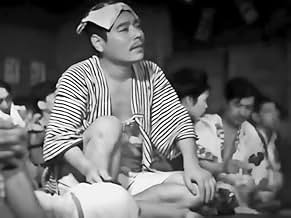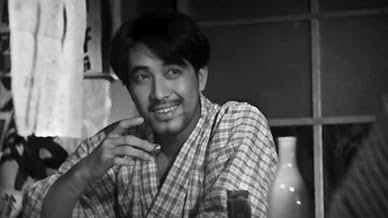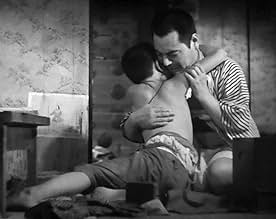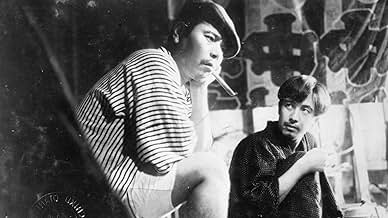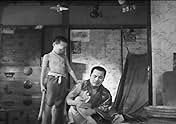NOTE IMDb
7,2/10
1,5 k
MA NOTE
Ajouter une intrigue dans votre langueTwo Tokyo co-workers come across a destitute young lady in search of a place to live.Two Tokyo co-workers come across a destitute young lady in search of a place to live.Two Tokyo co-workers come across a destitute young lady in search of a place to live.
- Réalisation
- Scénario
- Casting principal
- Récompenses
- 1 victoire au total
Den Ôhinata
- Jiro
- (as Den Obinata)
Tomio Aoki
- Tomio
- (as Tokkan Kozô)
Chishû Ryû
- Man on boat
- (non crédité)
Hideo Sugawara
- Boy Taunting Tomio
- (non crédité)
Avis à la une
Takeshi Sakamoto and Tokan Kozzo team up memorably yet again as an unemployed illiterate drunk and his resentful son, in this sentimental study of working class father-son relationships. As in I WAS BORN BUT... and TOKYO CHORUS, Ozu explores how children measure their self-esteem in their parents.
(1933) Passing Fancy/ Dekigokoro
SILENT DRAMA
Co-written and directed by Yasujirô Ozu that opens with a group of people sitting around listening to the speaker talking about the latest news. By the time it was over, the movie then focuses on the single father, Kihachi Kimura (Takeshi Sakamoto) his son, Tomio Kimura (Tomio Aoki) who is on the third grade; his best friend and neighbor, Jiro (Den Obinata) and the old lady, Otome (Chôko Iida) who kind of lives with them. When one day, a young lady, Harue (Nobuko Fushimi) who dresses like a geisha is wondering around homeless, with Kihachi taking her under his wing. We then learn more about them and their daily lives. For instance, Kihachi and his best friend, Jiro both work in a factory and do not enjoy it, and that Tomio consistently have to wake them up every morning to go to work, in which they sometimes often show up late.
The movie starts out routinely, and it did not become interesting until the father, Kihachi began arguing with his son, Tomio. The argument regards that his dad is not the most ideal father because he does not know how to read, and that he often drinks at the bar after he comes home. In other words, he is often an embarrassment to his only son. And the more I know more about the father, the more I wanted to know about what happened to his wife, which could be anything! Or what was his wife like, and how come she is not with him anymore- how did she ever put up with him. The father's life began to intrigue me, and I did not get enough of that as much as I hoped. The movie resonates on some areas, while does not work on others, such as the father, beginning to express interest on Harue! For some reason, I almost dozed off, I guess it's a consistent theme when an older man begins to express interest to a younger lady. I also kind of hoped how the father is able to go through his life without reading and writing. Like, can he at least know how to spell his name!
Co-written and directed by Yasujirô Ozu that opens with a group of people sitting around listening to the speaker talking about the latest news. By the time it was over, the movie then focuses on the single father, Kihachi Kimura (Takeshi Sakamoto) his son, Tomio Kimura (Tomio Aoki) who is on the third grade; his best friend and neighbor, Jiro (Den Obinata) and the old lady, Otome (Chôko Iida) who kind of lives with them. When one day, a young lady, Harue (Nobuko Fushimi) who dresses like a geisha is wondering around homeless, with Kihachi taking her under his wing. We then learn more about them and their daily lives. For instance, Kihachi and his best friend, Jiro both work in a factory and do not enjoy it, and that Tomio consistently have to wake them up every morning to go to work, in which they sometimes often show up late.
The movie starts out routinely, and it did not become interesting until the father, Kihachi began arguing with his son, Tomio. The argument regards that his dad is not the most ideal father because he does not know how to read, and that he often drinks at the bar after he comes home. In other words, he is often an embarrassment to his only son. And the more I know more about the father, the more I wanted to know about what happened to his wife, which could be anything! Or what was his wife like, and how come she is not with him anymore- how did she ever put up with him. The father's life began to intrigue me, and I did not get enough of that as much as I hoped. The movie resonates on some areas, while does not work on others, such as the father, beginning to express interest on Harue! For some reason, I almost dozed off, I guess it's a consistent theme when an older man begins to express interest to a younger lady. I also kind of hoped how the father is able to go through his life without reading and writing. Like, can he at least know how to spell his name!
Yasujiro Ozu is an extremely well respected film director. While not as famous today as his countryman, Kurosawa, among those who are fans of Japanese cinema, he is practically a god. While I have loved many of his films due to their amazing artistry and great direction, I also think that overall, many of his films are a tad overrated. In other words, because SOME films are near-perfect classics (such as both versions of FLOATING WEEDS or my favorite, LATE SPRING), people often tend to see ALL of his films as having the same quality. This is true of all the great directors, as there are a devoted group of followers that see every film as great--even if the films have obvious flaws or were made before the directors learned and perfected their craft.
I mention all this because although PASSING FANCY is a very good film, it's far from great--despite some amazingly positive reviews. While it's true that the Japanese film industry didn't switch to sound until very, very late compared to Western countries, shouldn't this be considered when giving out 10s to these silents? In other words, shouldn't technical merit be considered when reviewing a film? As such, I'd have to knock a point off the film. In addition, the film's plot is amazingly scant and a bit too ordinary.
Now in Ozu's defense, I must say that when it comes to the ordinary, nobody does it better. Here we have the story of a hard-drinking blue collar man and his young son and there's not a lot of excitement or action...but it STILL engages the audience due to his nice touch and excellent acting. In addition, the ending is very sweet and well done--even if nothing is exactly resolved in this story of very mundane individuals.
Well done and worth seeing but not exactly magical.
I mention all this because although PASSING FANCY is a very good film, it's far from great--despite some amazingly positive reviews. While it's true that the Japanese film industry didn't switch to sound until very, very late compared to Western countries, shouldn't this be considered when giving out 10s to these silents? In other words, shouldn't technical merit be considered when reviewing a film? As such, I'd have to knock a point off the film. In addition, the film's plot is amazingly scant and a bit too ordinary.
Now in Ozu's defense, I must say that when it comes to the ordinary, nobody does it better. Here we have the story of a hard-drinking blue collar man and his young son and there's not a lot of excitement or action...but it STILL engages the audience due to his nice touch and excellent acting. In addition, the ending is very sweet and well done--even if nothing is exactly resolved in this story of very mundane individuals.
Well done and worth seeing but not exactly magical.
Another early Ozu where family ties - severely tested but affirmed - steer the world away from havoc and into good. Another early Ozu that documents Japanese society being pushed through the wringer of Western influence, cinematically reflected with Chaplinesque beats: the father is a lazy factory worker and no good man-about-town, in stark contrast to the meek, corporate executive father in I Was Born But.., and once more the stubborn son has to live with the shame.
This go round and in comparison to the above film, the intended seduction of suburban life is less effective. The innocence of childhood is less the fulcrum of discovery of how the world works, and more a counterpoint to ordinary drama; thwarted love, strained friendship, high-minded sacrifice in the end that seduces noble, better persons out of everyone.
Everything turns out the way it does for a reason, the film whimsically asserts. Why is sea water salty? But of course for us to salt salmon with.
It is good and was awarded that year with a Kinema Jumpo beating films by future rivals Mizoguchi and Naruse. I assume it won for the denouement of selfless humanity - inspirationally miraculous and accompanied by fireworks in the sky - that must have echoed desirably at tumultuous times such as those, but there were more interesting things afoot in Japanese cinema of the time.
This go round and in comparison to the above film, the intended seduction of suburban life is less effective. The innocence of childhood is less the fulcrum of discovery of how the world works, and more a counterpoint to ordinary drama; thwarted love, strained friendship, high-minded sacrifice in the end that seduces noble, better persons out of everyone.
Everything turns out the way it does for a reason, the film whimsically asserts. Why is sea water salty? But of course for us to salt salmon with.
It is good and was awarded that year with a Kinema Jumpo beating films by future rivals Mizoguchi and Naruse. I assume it won for the denouement of selfless humanity - inspirationally miraculous and accompanied by fireworks in the sky - that must have echoed desirably at tumultuous times such as those, but there were more interesting things afoot in Japanese cinema of the time.
"Passing fancy" (1933) is the latest of the three "silent Ozu's" that I have watched recently (the others were "Tokyo chorus" (1931) and "I was born ... but" (1932)) and the most recent one. Despite the coming of sound Ozu still adheres (just like Chaplin) firmly to the silent tradition. In his view silent film was on his way to reaching perfection and this was threatened by the still infant and imperfect sound technology. "Passing fancy" has many slapstick elements. See for example how characters in this film scratch their buttocks to express uncertainty and discomfort.
"Passing fancy" is of al three silent Ozu's the one with the most contrast to his later oeuvre.
It is about a young son and an adult father in stead of about an adult son and elderly parents. The father is single. The father is working class and not middle class.
Apart from the father-son relationsship there is also a love triangle in this film. In his favourite pub one night there appears a young lady. The father inmediately falls for her charms, but his younger colleague does not trust the lady. Of course the lady herself prefers the younger colleague. The father does ridicule himself courting someone half his age and in the proces neglects his son. Halfway the film one wonders if the father is raising his son or the other way round.
At the end the father, who is pretty good in fooling himself, has ultimately to come to two conclusions. In the first place that he is too old for the young lady (who calls him "a nice uncle", at first much to his chagrin) and in the second place that he has been a lousy father.
Takashi Sakamoto plays the somewhat naive and not very clever father in such a sympathetic way that the next year he returned as the main charecter in Ozu's real breakthrough film "A story of floating weeds".
"Passing fancy" is of al three silent Ozu's the one with the most contrast to his later oeuvre.
It is about a young son and an adult father in stead of about an adult son and elderly parents. The father is single. The father is working class and not middle class.
Apart from the father-son relationsship there is also a love triangle in this film. In his favourite pub one night there appears a young lady. The father inmediately falls for her charms, but his younger colleague does not trust the lady. Of course the lady herself prefers the younger colleague. The father does ridicule himself courting someone half his age and in the proces neglects his son. Halfway the film one wonders if the father is raising his son or the other way round.
At the end the father, who is pretty good in fooling himself, has ultimately to come to two conclusions. In the first place that he is too old for the young lady (who calls him "a nice uncle", at first much to his chagrin) and in the second place that he has been a lousy father.
Takashi Sakamoto plays the somewhat naive and not very clever father in such a sympathetic way that the next year he returned as the main charecter in Ozu's real breakthrough film "A story of floating weeds".
Le saviez-vous
- AnecdotesYasujirô Ozu regular Chishû Ryû has a small role towards the end of the film as a fellow passenger on board a ship, playing an uncredited "Man on Boat".
- GaffesKihachi states that 50 sen to a boy his age (referring to Tomio) is like 10 ryo to him and Otome. The ryo was replaced by the yen in 1871, over 60 years earlier. (The yen replaced the ryo at par; there are 100 sen to the yen.)
However, Otome then says, "No, more like 1,000 yen!" So, it's possible "ryo" was still being used synonymously with "yen" over a half-century later.
- ConnexionsFeatured in Transcendental Style and Flatulence (2017)
Meilleurs choix
Connectez-vous pour évaluer et suivre la liste de favoris afin de recevoir des recommandations personnalisées
Détails
- Durée1 heure 40 minutes
- Couleur
- Mixage
- Rapport de forme
- 1.37 : 1
Contribuer à cette page
Suggérer une modification ou ajouter du contenu manquant

Lacune principale
By what name was Coeur capricieux (1933) officially released in Canada in English?
Répondre
